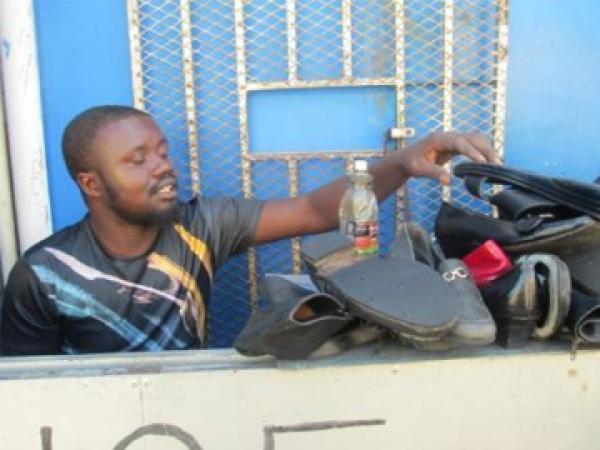What immigrants think of SA elections

GroundUp reporter Tariro Washyinyira asked immigrants what they thought of the South African elections. Some did not want to say anything, but others gave fascinating perspectives. The views expressed by the people Washinyira interviewed, some of which are racist, obviously do not reflect of those of GroundUp or Washinyira.
“But we do not vote!” This was the response from most foreign nationals I spoke to. Yet many I talked to are keenly aware of their political surroundings.
Obeng Anin-bodom is a refugee from Ghana. He was the only person I spoke to who was willing to be photographed and named. He lives in Khayelitsha and has been living in SA for seven years. He repairs shoes for a living. He is happy with his work and does not intend to work for anyone because he is enjoying his independence.
He last voted in 2002 in Ghana for the New Patriotic Party (NPP) but the party is now out of power. He said that South African elections do not mean much to him since he does not vote. He is not expecting much change from the political parties. He hopes in three years time he will be able to go back to his country of birth.
Anin-bodom says, “I believe the ANC will rule until Jesus comes. Malema is full of shit. I do not think even his girlfriend will vote for him. He is a joke. People do not take him seriously. If I could vote I would vote for DA. It is a good party and has the potential to create jobs for the unemployed.”
He continued, “Ever since I came to South Africa, a coloured or white person has never called me kwerekwere (an insulting name for foreigners). But in Khayelitsha even a toddler [calls me this]. Blacks are xenophobic and are aligned to the ANC.”
Comparing his country of birth with the local elections, he says the contestants are not doing much campaigning. In Ghana, he explains, politicians visit townships like Khayelitsha and make promises that they do not fulfil. Sometimes they start projects which they do not finish once the elections are over. However their elections are peaceful.
A 22-year-old Zimbabwean man who runs his business at Parow Market looked at me with amusement. “Sister how can you ask me the difference between South African and Zimbabwean elections? You are Zimbabwean surely you already know the situation. It’s peaceful here as if South Africans will not be voting in a few weeks time. DA, ANC and EFF supporters will stand in the same voting queue without harming each other. I have never heard an incident of violence during and post election in South Africa. Yet in Zimbabwe you could be beaten or harassed for just wearing an MDC t-shirt even if it’s not election time.”
Another Zimbabwean woman, who voted there in 2008, hopes the elections will mean a change of government and laws that govern how foreigners are treated. But the elections also scare her because their outcome may subject her to xenophobia attacks. She says she wishes the elections will bring basic human rights, fair treatment in government institutions, as well as the renewal of Zimbabwean Dispensation Programme permits.
Bayi from Bangladesh said he last voted in his country in 1998. He is now a South African citizen but will not vote again. He said, “Elections do not mean anything to me because what politicians tell us does not materialise at all. My South African friend was promised an RDP house ten years ago but he is still stuck in an informal settlement with no water, electricity and toilets. I really do not see the reason for voting.”
A man from Congo-Brazzaville identified himself as Simplice. He said he does not feel it is election time. From where he comes, there’s much more of an election vibe. “Back home, two months before the election, billboards from different parties will be erected in all towns and business centres in rural areas. I feel people should be motivated by campaigning by getting party t-shirts, caps, flyers and transport for rallies.”
Simplice said the elections do not mean much for him since he is not participating. But, he continued, the election would affect him if the political parties do not agree on the result and resort to war. This would traumatize him since he has already run away from war in his country of birth. “I never voted [in Congo-Brazzaville] because the election observers and all involved parties were not fair. They always planned before who should win. In my country they steal votes, the most voted party always loses. One of the politicians in Congo-Brazzaville admitted that they steal votes.”
Simplice continued, “Towards elections the ANC makes life difficult for foreigners so as to please black South Africans so that they vote for them. For instance if you go to Home Affairs now, your permit would be rejected so that black South Africans will be happy that their opponents are going back. I also believe that the Zimbabwe Dispensation Permit, which they said they are not renewing, is a political stance to buy votes from South African citizens. I wish politicians would not make life hard for immigrants during campaigning.”
Support independent journalism
Donate using Payfast

Next: EFF is not a left alternative
Previous: GroundUp Newsletter 04 April 2014: Who Killed Moses Tshake and other stories

This article is licensed under a Creative Commons Attribution-NoDerivatives 4.0 International License.
